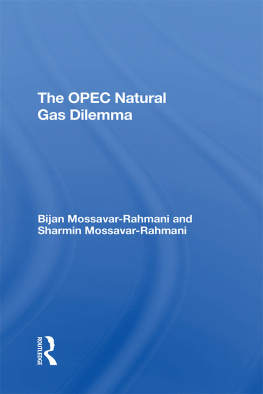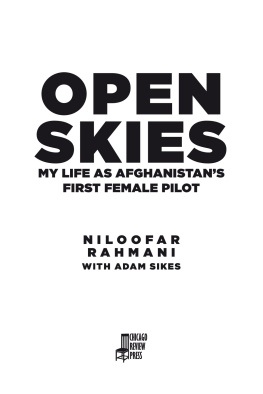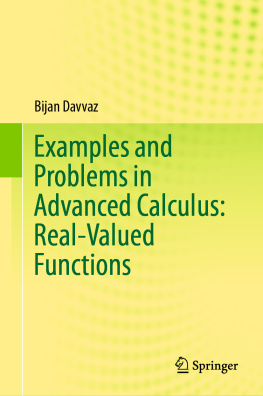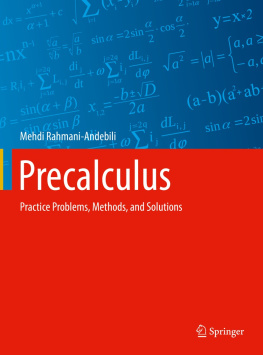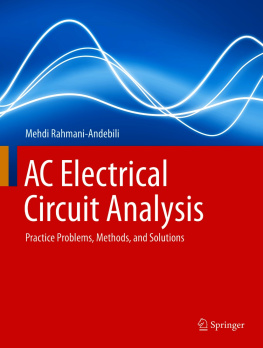The OPEC Natural Gas Dilemma
Also of Interest
OPEC and the United States: The Political Economy of Oil Supply, Ragaei El Mallakh and Barry Poulson
The Economics of Export Restrictions: Free Access to Commodity Markets and the NIEO, edited by Jimmy Weinblatt
Middle East Oil Crises Since 1973, Benjamin Shwadran
Technology Trade with the Middle East: Policy Issues and Economic Trends, James J. Emery, Norman A. Graham, and Michael F. Oppenheimer, The Futures Group
The Middle East , Oil and the Great Powers , Benjamin Shwadran
Natural Resource Economics: Selected papers, S. V. Ciriacy-Wantrup, edited by Richard C. Bishop and Stephen O. Andersen
Energy Pricing and Demand Management, Mohan Munasinghe
Renewable Energy for Industrialization and Development, David John Jhirad
Energy Resource Assessment, Alfred Petrick, Jr.
Energy Planning in Developing Countries, Peter M. Meier
Rural Energy Planning in Developing Countries: An Overview, Romir Chatterjee
Probability, Statistics, and Decision Making in the Atmospheric Sciences, edited by Allan H. Murphy and Richard W. Katz
Available in hardcover and paperback.
About the Book and Authors
The OPEC countries possess an estimated one-third of total world natural gas reserves, but they produce relatively small volumes of this clean, convenient, and flexible fuel, and much of what is produced is flared and wasted for lack of demand. Historically, the major barrier to full utilization of OPEC's natural gas potential has been the high cost of gathering, processing, and transporting natural gasrelative to cheap and easily available crude oil. Now, higher prices make a stepped-up international gas trade economically viable for the first time, but a host of formidable geopolitical, financial, risk-sharing, environmental, and other barriers remain to be resolved.
This volume, a primer on natural gas and international natural gas trade, also provides an inside view of how the OPEC countries view their options with respect to the medium- and long-term development of this important source of domestic energy and export earnings. The authors discuss the trade prospects and problems facing the OPEC nations, examine OPEC efforts to formulate a uniform price and export policy, and explore potential patterns of cooperation between exporters and importers. The authors also include current statistics on global natural gas supply and demand balances, as well as information on OPEC domestic natural gas projects and export contracts, both existing and planned.
Bijan Mossavar-Rahmani is research coordinator of the Harvard University Energy and Environmental Policy Center's International Natural Gas Study. A former delegate to OPEC Ministerial Conferences, he has published extensively on developments in crude oil and natural gas markets. Sharmin Mossavar-Rahmani is director of research with the Ryan Financial Strategy Group, New York, and has been a consultant to industry on energy and environmental issues. She is co-author with Bijan Mossavar-Rahmani of World Natural Gas Outlook: What Role for OPEC ? (1984).
A Report of the Harvard International Natural Gas Study
The OPEC Natural Gas Dilemma
Bijan Mossavar-Rahmani and Sharmin Mossavar-Rahmani
First published 1986 by Westview Press, Inc.
Published 2019 by Routledge
52 Vanderbilt Avenue, New York, NY 10017
2 Park Square, Milton Park, Abingdon, Oxon OX14 4RN
Routledge is an imprint of the Taylor & Francis Group, an informa business
Copyright 1986 Taylor & Francis
All rights reserved. No part of this book may be reprinted or reproduced utilised in any form or by any electronic, mechanical, or other means, now known or hereafter invented, including photocopying and recording, or in any information storage or retrieval system, without permission in writing from the publishers.
Notice:
Product or corporate names may be trademarks or registered trademarks, and are used only for identification and explanation without intent to infringe.
Library of Congress Cataloging in Publication Data
Mossavar-Rahmani, Bijan.
The OPEC natural gas dilemma.
(Westview special studies in International Economics and Business)
Includes index.
1. Gas industry. 2. Organization of Petroleum Exporting Countries. I. Mossavar
Rahmani, Sharmin B. II. Title. III. Series.
HD 9581.A2M67 1985 338.2'7285 85-5114
ISBN 13: 978-0-367-29453-3 (hbk)
To our families
Since 1980, falling demand for energy worldwide, pricing disputes between importers and exporters, and concern over security of supplies have combined to throw the future of international natural gas trade into considerable uncertainty. Numerous important projectsboth operational and plannedhave been suspended or shelved. Projections of future demand for imported natural gas have been substantially downscaled. Although earlier enthusiasm about the prospects for growth in international natural gas trade has largely dissipated, there is still every indication that within the major industrial countries, the gap between demand for natural gas, on the one hand, and indigenous production, on the other, will continue to widen.
Where will the natural gas to support the trade come from? Will economic and political decisions in the importing and exporting countries allow room for commercial arrangements conducive to the development of international natural gas trade on a larger scale? Outside the industrial countries, nine countries are now known to have sufficient exportable surpluses of natural gas to support world-scale liquefied natural gas (LNG) or pipeline projects. Six of these are members of the Organization of the Petroleum Exporting Countries (OPEC): Iran, Algeria, Qatar, the United Arab Emirates, Indonesia, and Nigeria. (The other three are the Soviet Union, Mexico, and Malaysia.) Indeed, the OPEC countries together hold one-third of the world's proven reserves of natural gas. With the exception of several modest projects, this vast resource base is still to be exploited.
This study examines the prospects for the development of OPEC natural gas and discusses the potential role of OPEC in the international natural gas trade. We conclude that although OPEC could support a substantial expansion of its natural gas exports, the current economics of the natural gas trade provide very little incentive for it to do so. Indeed, our estimates suggest that given prevailing natural gas prices, a new OPEC export project in West Africa or the Gulf would at best yield a tiny positive net-back to the exporter, and, at worst, a substantial negative one.
Publicly, the OPEC countries, led by Algeria, have taken the position that the wellhead price of natural gas should be tied to that of crude oil as a "necessary incentive to develop reserves economically." Privately, however, the OPEC countries have accepted more flexibleand less advantageouspricing formulae. Meanwhile, several OPEC countries are weighing the opportunities for, and consequences of, alternative patterns of natural gas resource development. One such alternative, the transfer of natural gas-based industries to the exporting countries themselves, in the form of large-scale petrochemicals projects, appears dicey at best. Our clear preference is the stepped-up internal consumption of natural gas in the OPEC countries to release more crude oil for export. Given lower processing and transportation costs, the net-back to an exporting country from sales of crude oil will greatly exceed that from sales of natural gasunit for unitunder any reasonable set of market assumptions.


